ODSC7031 Spring 2019: Operation Delivery and Strategic Commissioning
VerifiedAdded on 2023/04/23
|21
|5376
|50
Essay
AI Summary
This essay critically evaluates resource implications, framework planning, and management of health services in the UK, focusing on strategic management within the NHS. It explores the roles of strategic management in NHS, models and frameworks influencing procurement and commissioning, and international and national practices. The essay highlights the importance of effective planning, innovation, and adaptation to changes in healthcare services, emphasizing the need for NHS to build trust, prioritize patient needs, and improve strategic planning to ensure clinical and financial sustainability. It also discusses the roles of change managers, commissioning managers, directors of strategic development, and general managers within the NHS, along with the IPC model and the impact of policies like the NSF for mental health on commissioning practices.
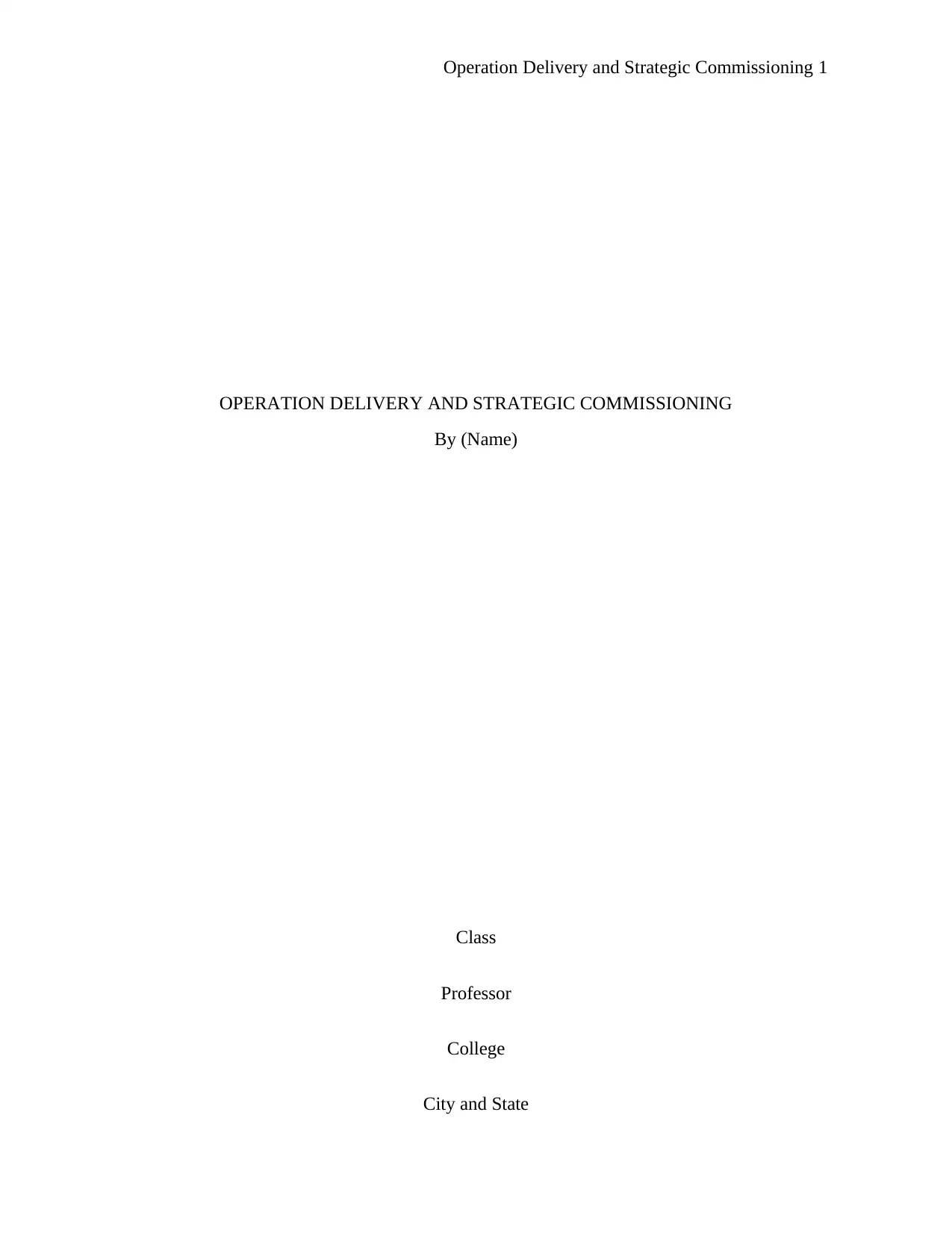
Operation Delivery and Strategic Commissioning 1
OPERATION DELIVERY AND STRATEGIC COMMISSIONING
By (Name)
Class
Professor
College
City and State
OPERATION DELIVERY AND STRATEGIC COMMISSIONING
By (Name)
Class
Professor
College
City and State
Paraphrase This Document
Need a fresh take? Get an instant paraphrase of this document with our AI Paraphraser
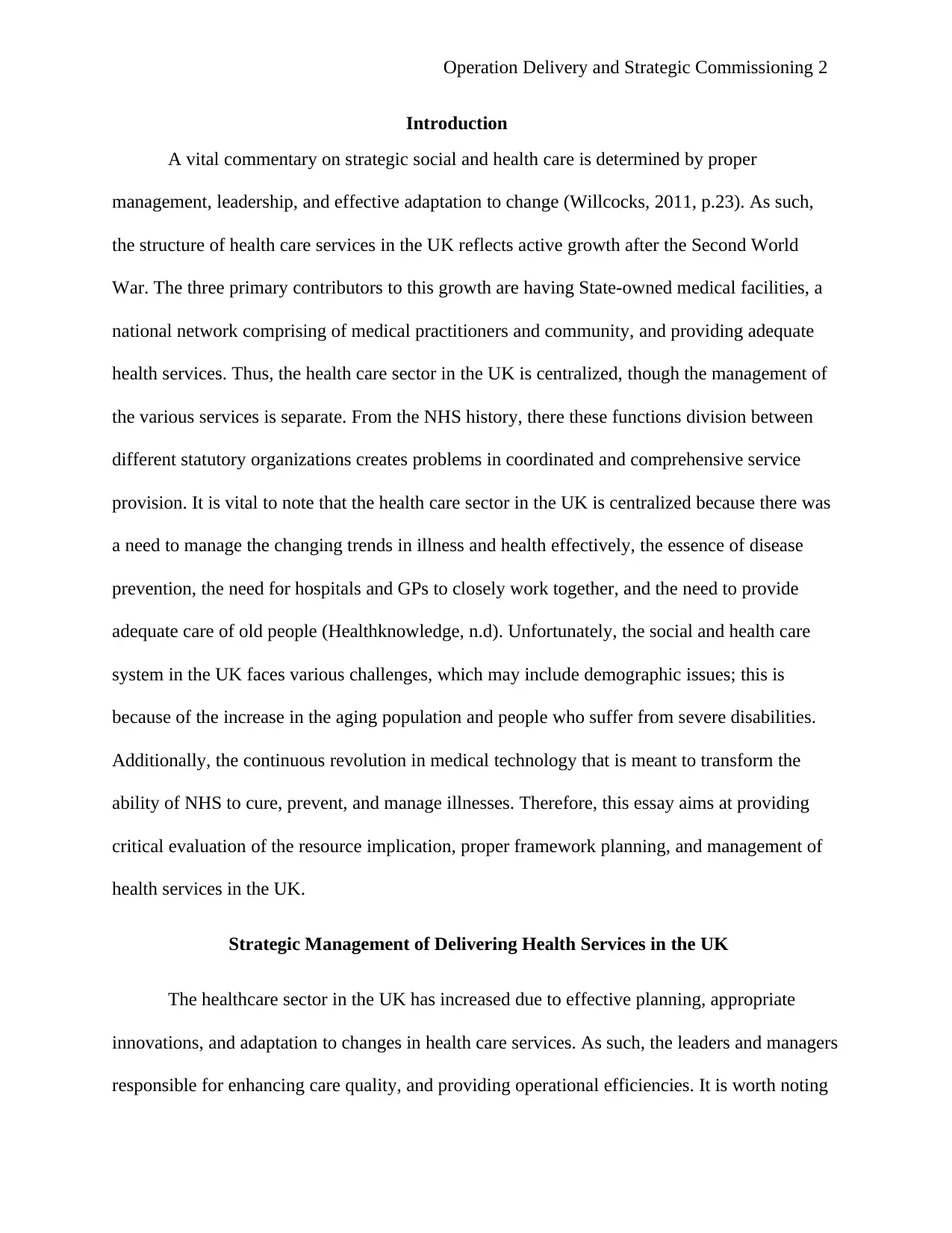
Operation Delivery and Strategic Commissioning 2
Introduction
A vital commentary on strategic social and health care is determined by proper
management, leadership, and effective adaptation to change (Willcocks, 2011, p.23). As such,
the structure of health care services in the UK reflects active growth after the Second World
War. The three primary contributors to this growth are having State-owned medical facilities, a
national network comprising of medical practitioners and community, and providing adequate
health services. Thus, the health care sector in the UK is centralized, though the management of
the various services is separate. From the NHS history, there these functions division between
different statutory organizations creates problems in coordinated and comprehensive service
provision. It is vital to note that the health care sector in the UK is centralized because there was
a need to manage the changing trends in illness and health effectively, the essence of disease
prevention, the need for hospitals and GPs to closely work together, and the need to provide
adequate care of old people (Healthknowledge, n.d). Unfortunately, the social and health care
system in the UK faces various challenges, which may include demographic issues; this is
because of the increase in the aging population and people who suffer from severe disabilities.
Additionally, the continuous revolution in medical technology that is meant to transform the
ability of NHS to cure, prevent, and manage illnesses. Therefore, this essay aims at providing
critical evaluation of the resource implication, proper framework planning, and management of
health services in the UK.
Strategic Management of Delivering Health Services in the UK
The healthcare sector in the UK has increased due to effective planning, appropriate
innovations, and adaptation to changes in health care services. As such, the leaders and managers
responsible for enhancing care quality, and providing operational efficiencies. It is worth noting
Introduction
A vital commentary on strategic social and health care is determined by proper
management, leadership, and effective adaptation to change (Willcocks, 2011, p.23). As such,
the structure of health care services in the UK reflects active growth after the Second World
War. The three primary contributors to this growth are having State-owned medical facilities, a
national network comprising of medical practitioners and community, and providing adequate
health services. Thus, the health care sector in the UK is centralized, though the management of
the various services is separate. From the NHS history, there these functions division between
different statutory organizations creates problems in coordinated and comprehensive service
provision. It is vital to note that the health care sector in the UK is centralized because there was
a need to manage the changing trends in illness and health effectively, the essence of disease
prevention, the need for hospitals and GPs to closely work together, and the need to provide
adequate care of old people (Healthknowledge, n.d). Unfortunately, the social and health care
system in the UK faces various challenges, which may include demographic issues; this is
because of the increase in the aging population and people who suffer from severe disabilities.
Additionally, the continuous revolution in medical technology that is meant to transform the
ability of NHS to cure, prevent, and manage illnesses. Therefore, this essay aims at providing
critical evaluation of the resource implication, proper framework planning, and management of
health services in the UK.
Strategic Management of Delivering Health Services in the UK
The healthcare sector in the UK has increased due to effective planning, appropriate
innovations, and adaptation to changes in health care services. As such, the leaders and managers
responsible for enhancing care quality, and providing operational efficiencies. It is worth noting
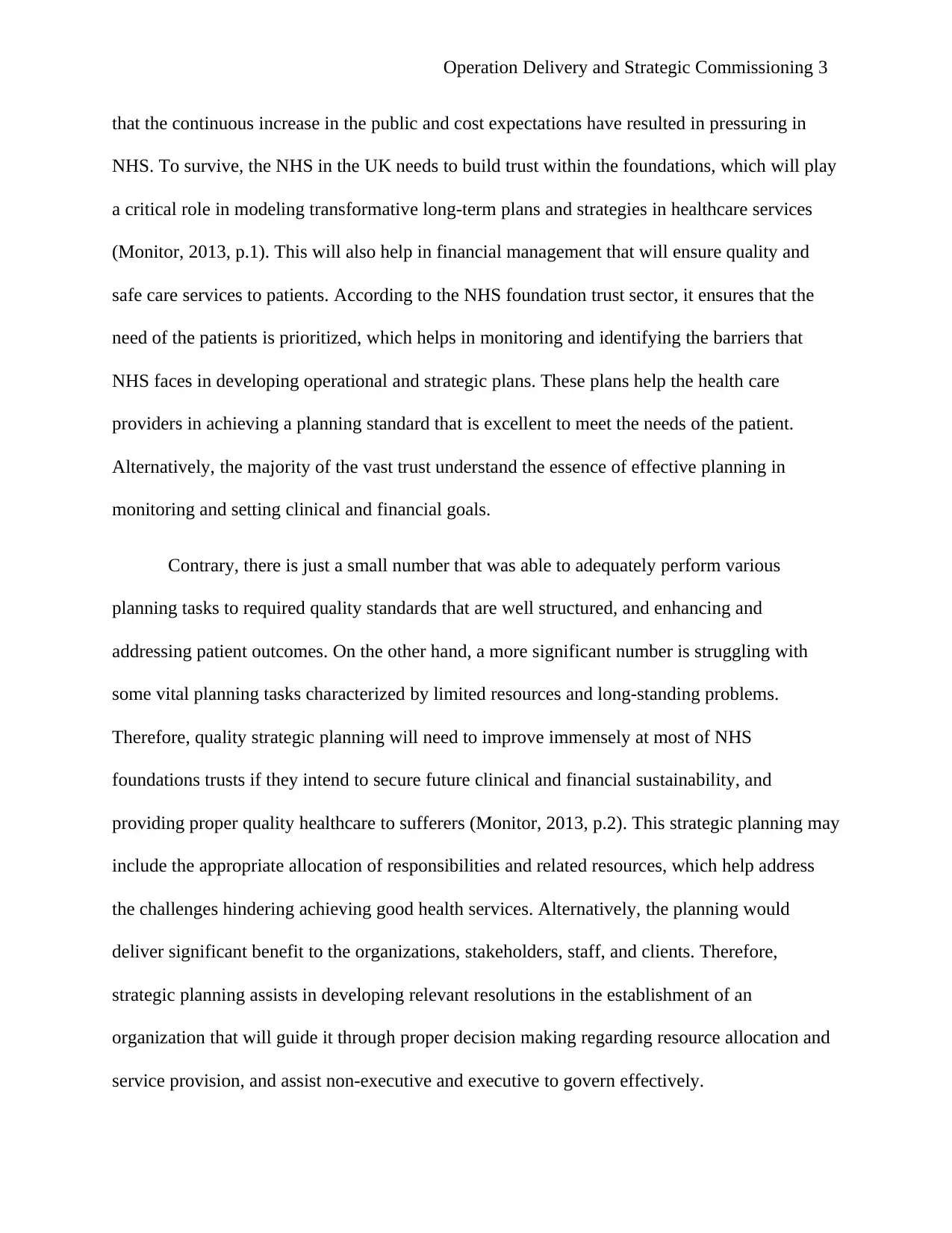
Operation Delivery and Strategic Commissioning 3
that the continuous increase in the public and cost expectations have resulted in pressuring in
NHS. To survive, the NHS in the UK needs to build trust within the foundations, which will play
a critical role in modeling transformative long-term plans and strategies in healthcare services
(Monitor, 2013, p.1). This will also help in financial management that will ensure quality and
safe care services to patients. According to the NHS foundation trust sector, it ensures that the
need of the patients is prioritized, which helps in monitoring and identifying the barriers that
NHS faces in developing operational and strategic plans. These plans help the health care
providers in achieving a planning standard that is excellent to meet the needs of the patient.
Alternatively, the majority of the vast trust understand the essence of effective planning in
monitoring and setting clinical and financial goals.
Contrary, there is just a small number that was able to adequately perform various
planning tasks to required quality standards that are well structured, and enhancing and
addressing patient outcomes. On the other hand, a more significant number is struggling with
some vital planning tasks characterized by limited resources and long-standing problems.
Therefore, quality strategic planning will need to improve immensely at most of NHS
foundations trusts if they intend to secure future clinical and financial sustainability, and
providing proper quality healthcare to sufferers (Monitor, 2013, p.2). This strategic planning may
include the appropriate allocation of responsibilities and related resources, which help address
the challenges hindering achieving good health services. Alternatively, the planning would
deliver significant benefit to the organizations, stakeholders, staff, and clients. Therefore,
strategic planning assists in developing relevant resolutions in the establishment of an
organization that will guide it through proper decision making regarding resource allocation and
service provision, and assist non-executive and executive to govern effectively.
that the continuous increase in the public and cost expectations have resulted in pressuring in
NHS. To survive, the NHS in the UK needs to build trust within the foundations, which will play
a critical role in modeling transformative long-term plans and strategies in healthcare services
(Monitor, 2013, p.1). This will also help in financial management that will ensure quality and
safe care services to patients. According to the NHS foundation trust sector, it ensures that the
need of the patients is prioritized, which helps in monitoring and identifying the barriers that
NHS faces in developing operational and strategic plans. These plans help the health care
providers in achieving a planning standard that is excellent to meet the needs of the patient.
Alternatively, the majority of the vast trust understand the essence of effective planning in
monitoring and setting clinical and financial goals.
Contrary, there is just a small number that was able to adequately perform various
planning tasks to required quality standards that are well structured, and enhancing and
addressing patient outcomes. On the other hand, a more significant number is struggling with
some vital planning tasks characterized by limited resources and long-standing problems.
Therefore, quality strategic planning will need to improve immensely at most of NHS
foundations trusts if they intend to secure future clinical and financial sustainability, and
providing proper quality healthcare to sufferers (Monitor, 2013, p.2). This strategic planning may
include the appropriate allocation of responsibilities and related resources, which help address
the challenges hindering achieving good health services. Alternatively, the planning would
deliver significant benefit to the organizations, stakeholders, staff, and clients. Therefore,
strategic planning assists in developing relevant resolutions in the establishment of an
organization that will guide it through proper decision making regarding resource allocation and
service provision, and assist non-executive and executive to govern effectively.
⊘ This is a preview!⊘
Do you want full access?
Subscribe today to unlock all pages.

Trusted by 1+ million students worldwide
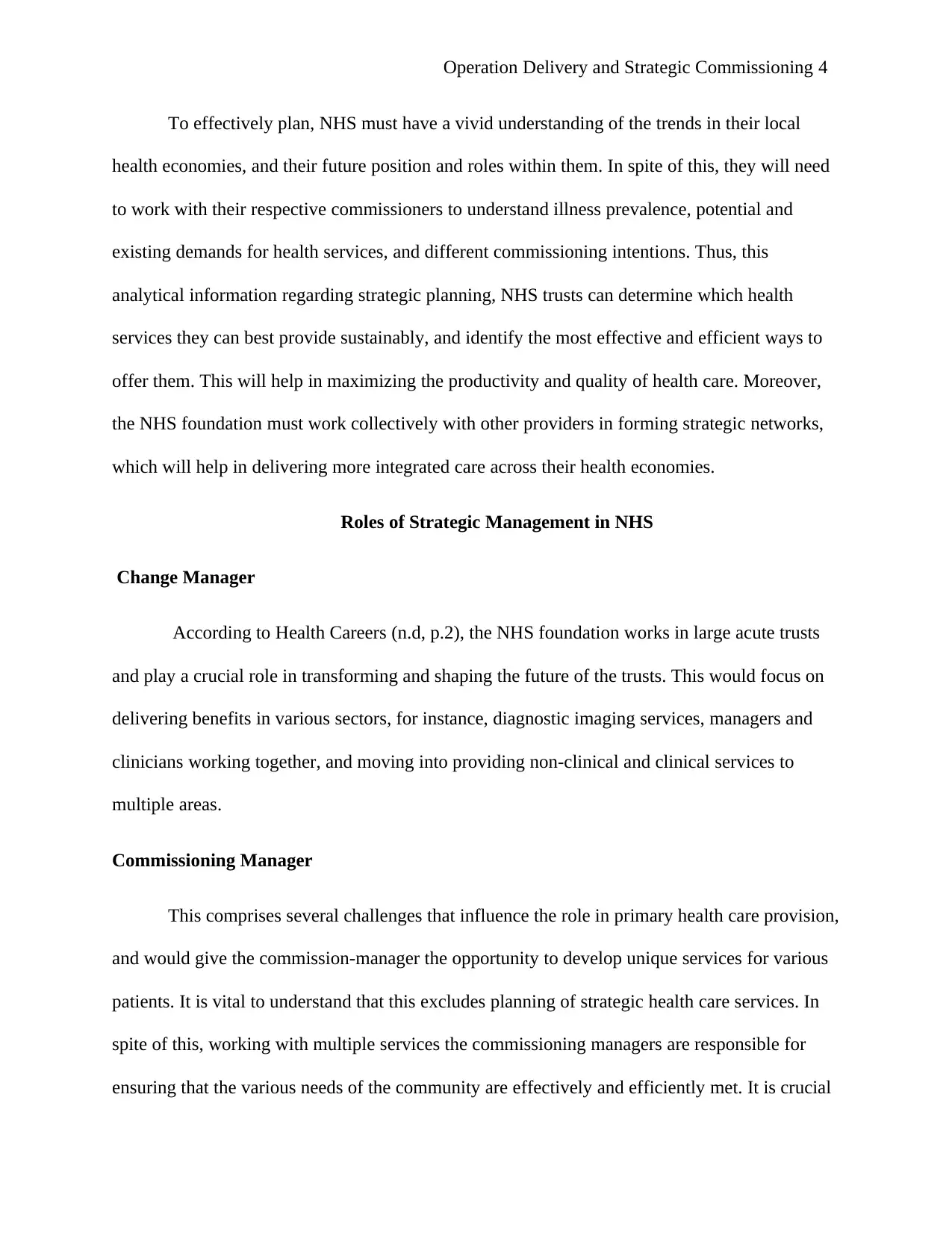
Operation Delivery and Strategic Commissioning 4
To effectively plan, NHS must have a vivid understanding of the trends in their local
health economies, and their future position and roles within them. In spite of this, they will need
to work with their respective commissioners to understand illness prevalence, potential and
existing demands for health services, and different commissioning intentions. Thus, this
analytical information regarding strategic planning, NHS trusts can determine which health
services they can best provide sustainably, and identify the most effective and efficient ways to
offer them. This will help in maximizing the productivity and quality of health care. Moreover,
the NHS foundation must work collectively with other providers in forming strategic networks,
which will help in delivering more integrated care across their health economies.
Roles of Strategic Management in NHS
Change Manager
According to Health Careers (n.d, p.2), the NHS foundation works in large acute trusts
and play a crucial role in transforming and shaping the future of the trusts. This would focus on
delivering benefits in various sectors, for instance, diagnostic imaging services, managers and
clinicians working together, and moving into providing non-clinical and clinical services to
multiple areas.
Commissioning Manager
This comprises several challenges that influence the role in primary health care provision,
and would give the commission-manager the opportunity to develop unique services for various
patients. It is vital to understand that this excludes planning of strategic health care services. In
spite of this, working with multiple services the commissioning managers are responsible for
ensuring that the various needs of the community are effectively and efficiently met. It is crucial
To effectively plan, NHS must have a vivid understanding of the trends in their local
health economies, and their future position and roles within them. In spite of this, they will need
to work with their respective commissioners to understand illness prevalence, potential and
existing demands for health services, and different commissioning intentions. Thus, this
analytical information regarding strategic planning, NHS trusts can determine which health
services they can best provide sustainably, and identify the most effective and efficient ways to
offer them. This will help in maximizing the productivity and quality of health care. Moreover,
the NHS foundation must work collectively with other providers in forming strategic networks,
which will help in delivering more integrated care across their health economies.
Roles of Strategic Management in NHS
Change Manager
According to Health Careers (n.d, p.2), the NHS foundation works in large acute trusts
and play a crucial role in transforming and shaping the future of the trusts. This would focus on
delivering benefits in various sectors, for instance, diagnostic imaging services, managers and
clinicians working together, and moving into providing non-clinical and clinical services to
multiple areas.
Commissioning Manager
This comprises several challenges that influence the role in primary health care provision,
and would give the commission-manager the opportunity to develop unique services for various
patients. It is vital to understand that this excludes planning of strategic health care services. In
spite of this, working with multiple services the commissioning managers are responsible for
ensuring that the various needs of the community are effectively and efficiently met. It is crucial
Paraphrase This Document
Need a fresh take? Get an instant paraphrase of this document with our AI Paraphraser
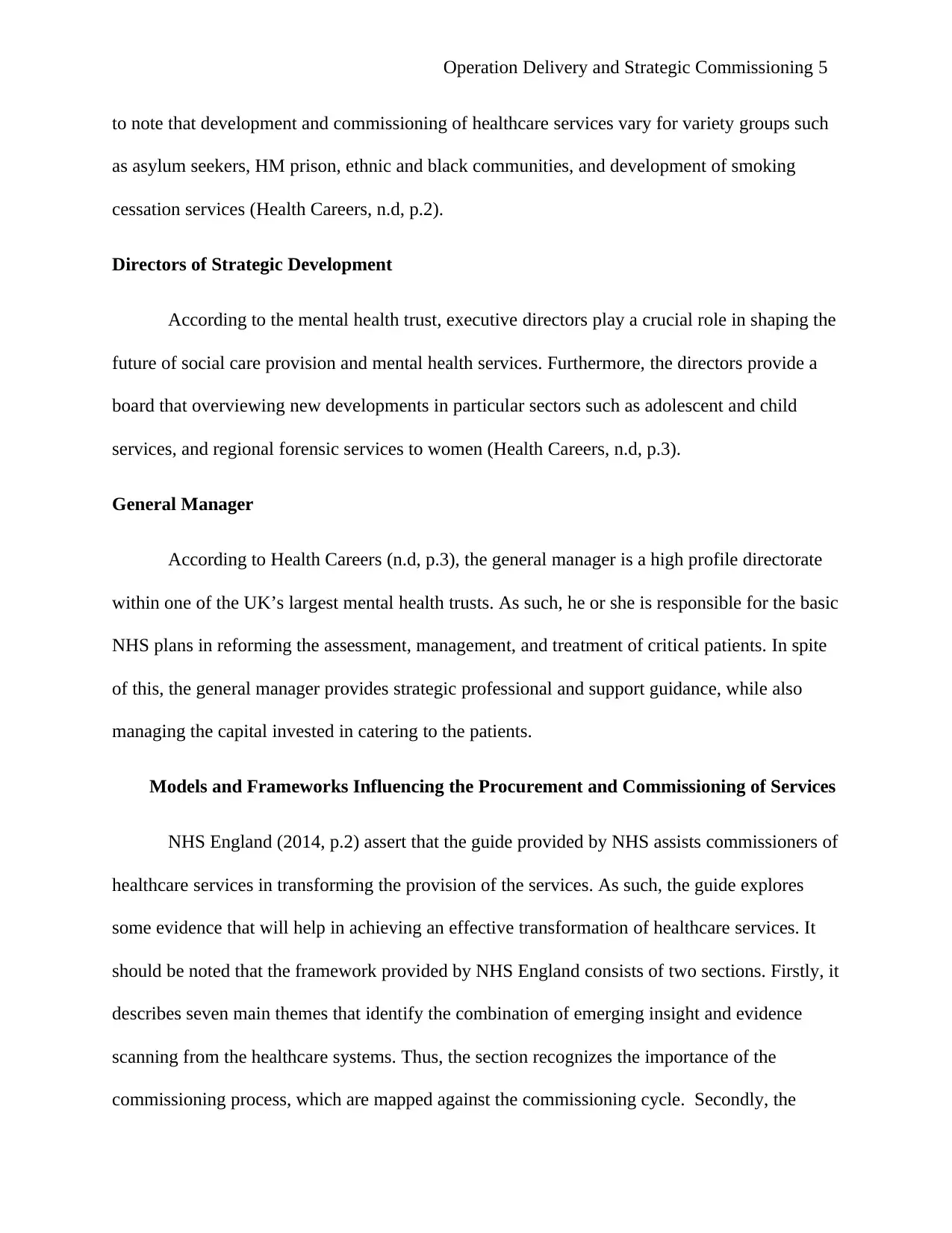
Operation Delivery and Strategic Commissioning 5
to note that development and commissioning of healthcare services vary for variety groups such
as asylum seekers, HM prison, ethnic and black communities, and development of smoking
cessation services (Health Careers, n.d, p.2).
Directors of Strategic Development
According to the mental health trust, executive directors play a crucial role in shaping the
future of social care provision and mental health services. Furthermore, the directors provide a
board that overviewing new developments in particular sectors such as adolescent and child
services, and regional forensic services to women (Health Careers, n.d, p.3).
General Manager
According to Health Careers (n.d, p.3), the general manager is a high profile directorate
within one of the UK’s largest mental health trusts. As such, he or she is responsible for the basic
NHS plans in reforming the assessment, management, and treatment of critical patients. In spite
of this, the general manager provides strategic professional and support guidance, while also
managing the capital invested in catering to the patients.
Models and Frameworks Influencing the Procurement and Commissioning of Services
NHS England (2014, p.2) assert that the guide provided by NHS assists commissioners of
healthcare services in transforming the provision of the services. As such, the guide explores
some evidence that will help in achieving an effective transformation of healthcare services. It
should be noted that the framework provided by NHS England consists of two sections. Firstly, it
describes seven main themes that identify the combination of emerging insight and evidence
scanning from the healthcare systems. Thus, the section recognizes the importance of the
commissioning process, which are mapped against the commissioning cycle. Secondly, the
to note that development and commissioning of healthcare services vary for variety groups such
as asylum seekers, HM prison, ethnic and black communities, and development of smoking
cessation services (Health Careers, n.d, p.2).
Directors of Strategic Development
According to the mental health trust, executive directors play a crucial role in shaping the
future of social care provision and mental health services. Furthermore, the directors provide a
board that overviewing new developments in particular sectors such as adolescent and child
services, and regional forensic services to women (Health Careers, n.d, p.3).
General Manager
According to Health Careers (n.d, p.3), the general manager is a high profile directorate
within one of the UK’s largest mental health trusts. As such, he or she is responsible for the basic
NHS plans in reforming the assessment, management, and treatment of critical patients. In spite
of this, the general manager provides strategic professional and support guidance, while also
managing the capital invested in catering to the patients.
Models and Frameworks Influencing the Procurement and Commissioning of Services
NHS England (2014, p.2) assert that the guide provided by NHS assists commissioners of
healthcare services in transforming the provision of the services. As such, the guide explores
some evidence that will help in achieving an effective transformation of healthcare services. It
should be noted that the framework provided by NHS England consists of two sections. Firstly, it
describes seven main themes that identify the combination of emerging insight and evidence
scanning from the healthcare systems. Thus, the section recognizes the importance of the
commissioning process, which are mapped against the commissioning cycle. Secondly, the
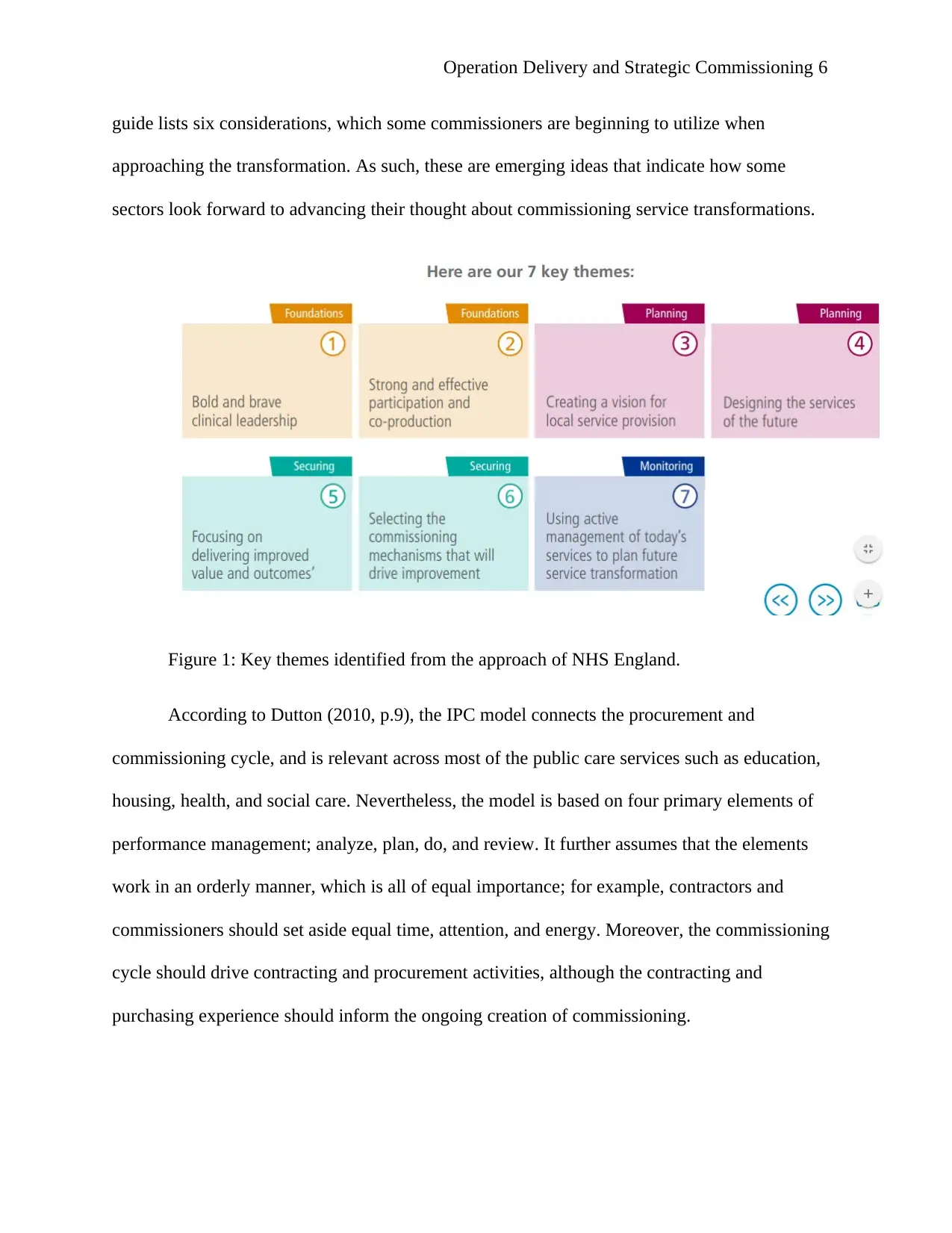
Operation Delivery and Strategic Commissioning 6
guide lists six considerations, which some commissioners are beginning to utilize when
approaching the transformation. As such, these are emerging ideas that indicate how some
sectors look forward to advancing their thought about commissioning service transformations.
Figure 1: Key themes identified from the approach of NHS England.
According to Dutton (2010, p.9), the IPC model connects the procurement and
commissioning cycle, and is relevant across most of the public care services such as education,
housing, health, and social care. Nevertheless, the model is based on four primary elements of
performance management; analyze, plan, do, and review. It further assumes that the elements
work in an orderly manner, which is all of equal importance; for example, contractors and
commissioners should set aside equal time, attention, and energy. Moreover, the commissioning
cycle should drive contracting and procurement activities, although the contracting and
purchasing experience should inform the ongoing creation of commissioning.
guide lists six considerations, which some commissioners are beginning to utilize when
approaching the transformation. As such, these are emerging ideas that indicate how some
sectors look forward to advancing their thought about commissioning service transformations.
Figure 1: Key themes identified from the approach of NHS England.
According to Dutton (2010, p.9), the IPC model connects the procurement and
commissioning cycle, and is relevant across most of the public care services such as education,
housing, health, and social care. Nevertheless, the model is based on four primary elements of
performance management; analyze, plan, do, and review. It further assumes that the elements
work in an orderly manner, which is all of equal importance; for example, contractors and
commissioners should set aside equal time, attention, and energy. Moreover, the commissioning
cycle should drive contracting and procurement activities, although the contracting and
purchasing experience should inform the ongoing creation of commissioning.
⊘ This is a preview!⊘
Do you want full access?
Subscribe today to unlock all pages.

Trusted by 1+ million students worldwide
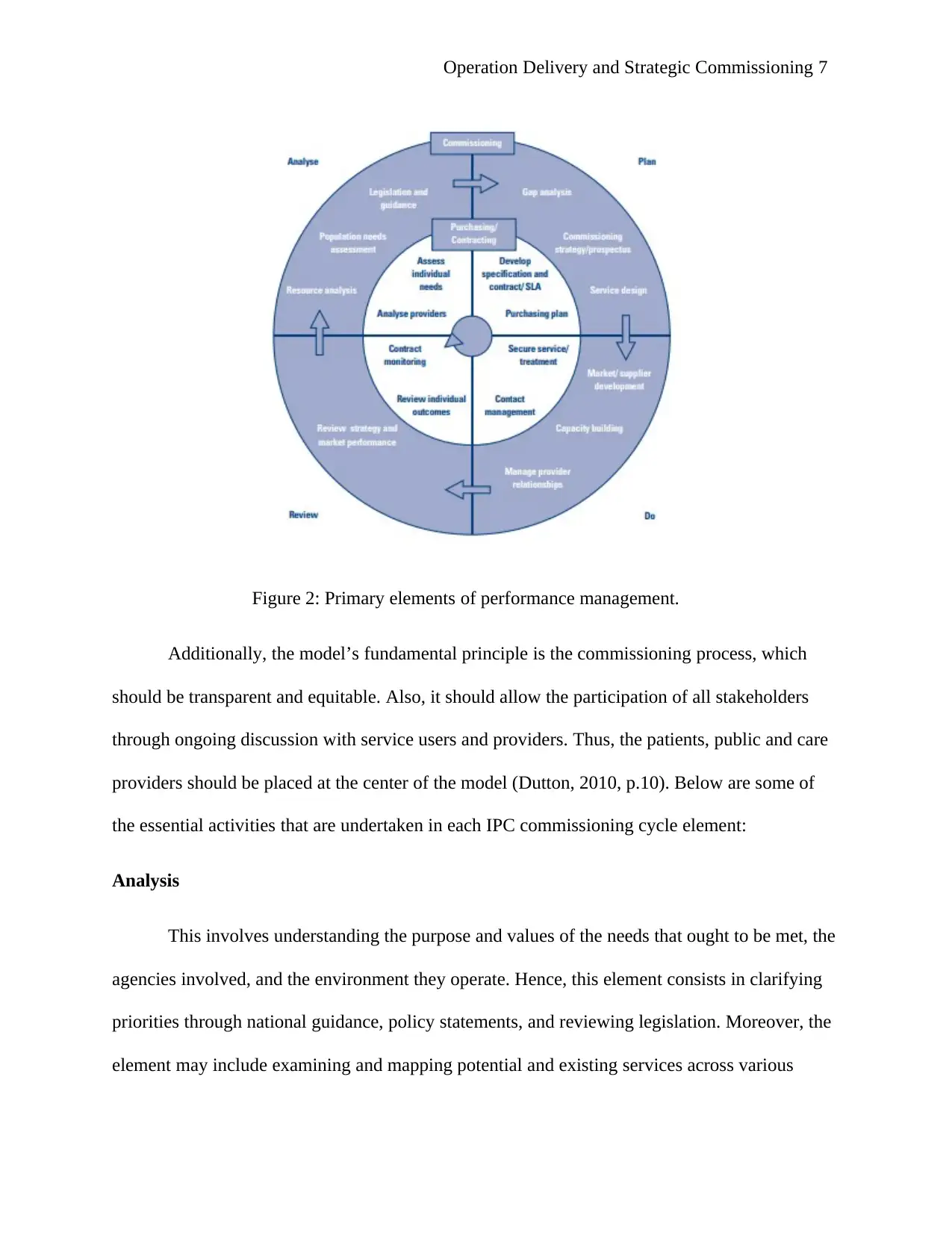
Operation Delivery and Strategic Commissioning 7
Figure 2: Primary elements of performance management.
Additionally, the model’s fundamental principle is the commissioning process, which
should be transparent and equitable. Also, it should allow the participation of all stakeholders
through ongoing discussion with service users and providers. Thus, the patients, public and care
providers should be placed at the center of the model (Dutton, 2010, p.10). Below are some of
the essential activities that are undertaken in each IPC commissioning cycle element:
Analysis
This involves understanding the purpose and values of the needs that ought to be met, the
agencies involved, and the environment they operate. Hence, this element consists in clarifying
priorities through national guidance, policy statements, and reviewing legislation. Moreover, the
element may include examining and mapping potential and existing services across various
Figure 2: Primary elements of performance management.
Additionally, the model’s fundamental principle is the commissioning process, which
should be transparent and equitable. Also, it should allow the participation of all stakeholders
through ongoing discussion with service users and providers. Thus, the patients, public and care
providers should be placed at the center of the model (Dutton, 2010, p.10). Below are some of
the essential activities that are undertaken in each IPC commissioning cycle element:
Analysis
This involves understanding the purpose and values of the needs that ought to be met, the
agencies involved, and the environment they operate. Hence, this element consists in clarifying
priorities through national guidance, policy statements, and reviewing legislation. Moreover, the
element may include examining and mapping potential and existing services across various
Paraphrase This Document
Need a fresh take? Get an instant paraphrase of this document with our AI Paraphraser
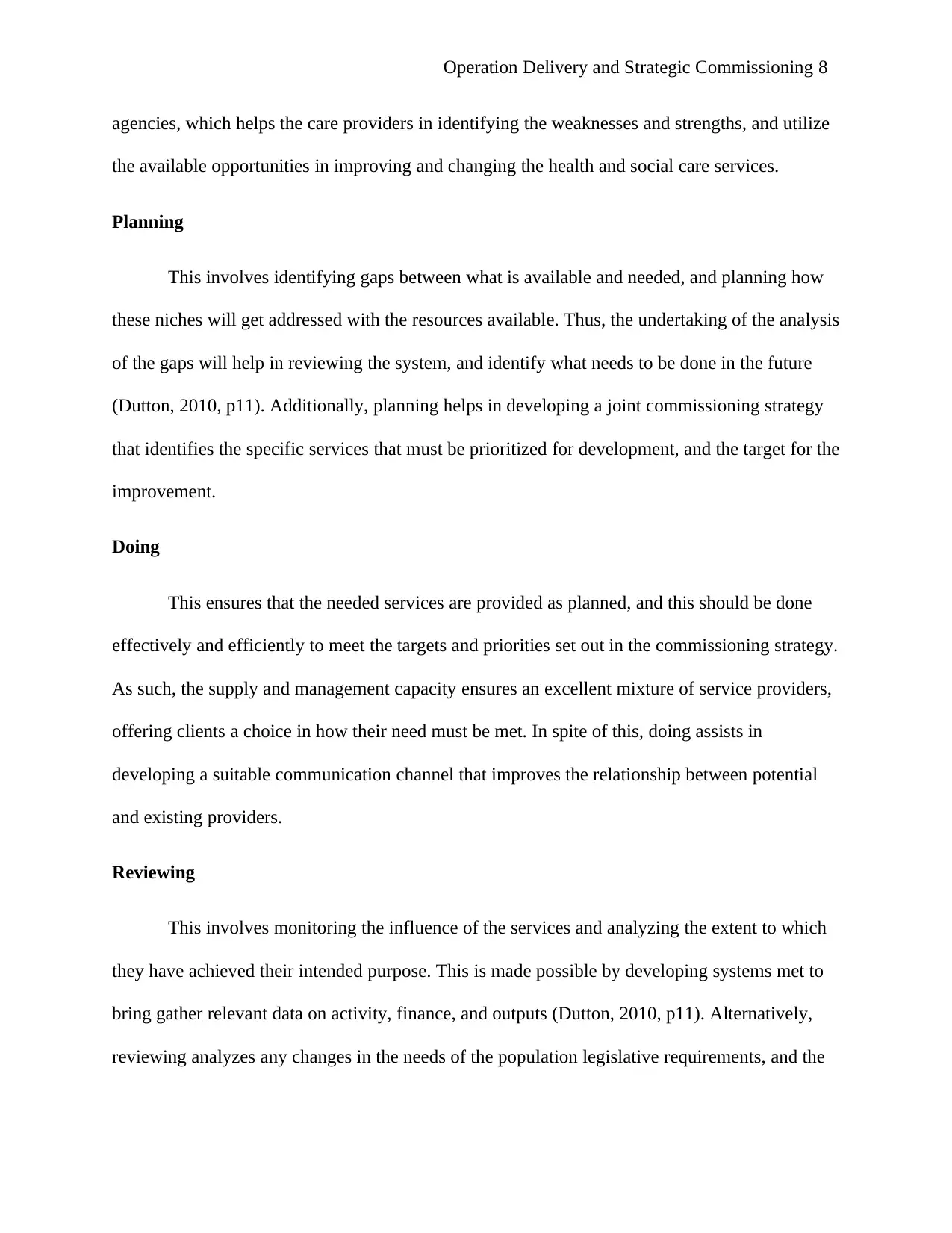
Operation Delivery and Strategic Commissioning 8
agencies, which helps the care providers in identifying the weaknesses and strengths, and utilize
the available opportunities in improving and changing the health and social care services.
Planning
This involves identifying gaps between what is available and needed, and planning how
these niches will get addressed with the resources available. Thus, the undertaking of the analysis
of the gaps will help in reviewing the system, and identify what needs to be done in the future
(Dutton, 2010, p11). Additionally, planning helps in developing a joint commissioning strategy
that identifies the specific services that must be prioritized for development, and the target for the
improvement.
Doing
This ensures that the needed services are provided as planned, and this should be done
effectively and efficiently to meet the targets and priorities set out in the commissioning strategy.
As such, the supply and management capacity ensures an excellent mixture of service providers,
offering clients a choice in how their need must be met. In spite of this, doing assists in
developing a suitable communication channel that improves the relationship between potential
and existing providers.
Reviewing
This involves monitoring the influence of the services and analyzing the extent to which
they have achieved their intended purpose. This is made possible by developing systems met to
bring gather relevant data on activity, finance, and outputs (Dutton, 2010, p11). Alternatively,
reviewing analyzes any changes in the needs of the population legislative requirements, and the
agencies, which helps the care providers in identifying the weaknesses and strengths, and utilize
the available opportunities in improving and changing the health and social care services.
Planning
This involves identifying gaps between what is available and needed, and planning how
these niches will get addressed with the resources available. Thus, the undertaking of the analysis
of the gaps will help in reviewing the system, and identify what needs to be done in the future
(Dutton, 2010, p11). Additionally, planning helps in developing a joint commissioning strategy
that identifies the specific services that must be prioritized for development, and the target for the
improvement.
Doing
This ensures that the needed services are provided as planned, and this should be done
effectively and efficiently to meet the targets and priorities set out in the commissioning strategy.
As such, the supply and management capacity ensures an excellent mixture of service providers,
offering clients a choice in how their need must be met. In spite of this, doing assists in
developing a suitable communication channel that improves the relationship between potential
and existing providers.
Reviewing
This involves monitoring the influence of the services and analyzing the extent to which
they have achieved their intended purpose. This is made possible by developing systems met to
bring gather relevant data on activity, finance, and outputs (Dutton, 2010, p11). Alternatively,
reviewing analyzes any changes in the needs of the population legislative requirements, and the
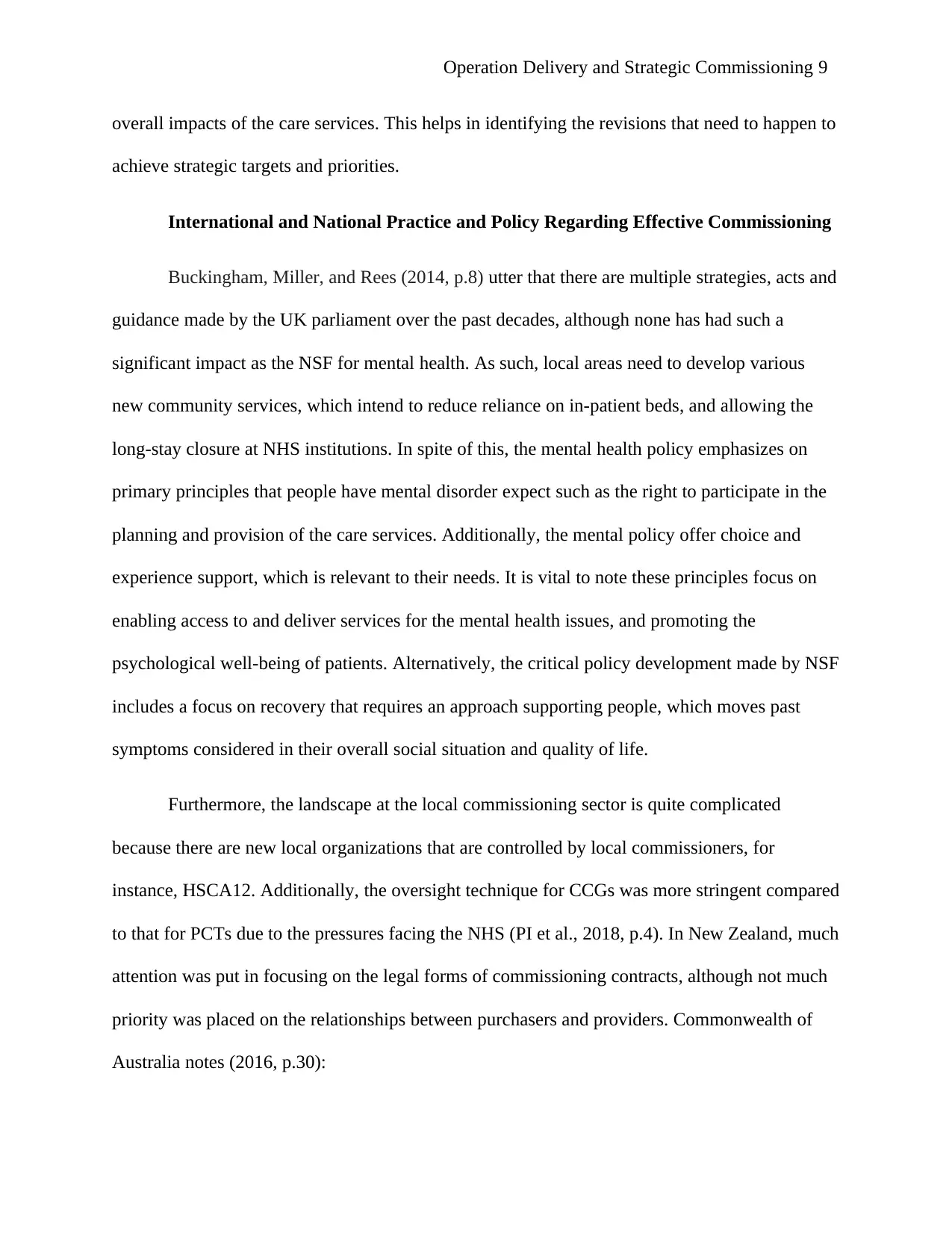
Operation Delivery and Strategic Commissioning 9
overall impacts of the care services. This helps in identifying the revisions that need to happen to
achieve strategic targets and priorities.
International and National Practice and Policy Regarding Effective Commissioning
Buckingham, Miller, and Rees (2014, p.8) utter that there are multiple strategies, acts and
guidance made by the UK parliament over the past decades, although none has had such a
significant impact as the NSF for mental health. As such, local areas need to develop various
new community services, which intend to reduce reliance on in-patient beds, and allowing the
long-stay closure at NHS institutions. In spite of this, the mental health policy emphasizes on
primary principles that people have mental disorder expect such as the right to participate in the
planning and provision of the care services. Additionally, the mental policy offer choice and
experience support, which is relevant to their needs. It is vital to note these principles focus on
enabling access to and deliver services for the mental health issues, and promoting the
psychological well-being of patients. Alternatively, the critical policy development made by NSF
includes a focus on recovery that requires an approach supporting people, which moves past
symptoms considered in their overall social situation and quality of life.
Furthermore, the landscape at the local commissioning sector is quite complicated
because there are new local organizations that are controlled by local commissioners, for
instance, HSCA12. Additionally, the oversight technique for CCGs was more stringent compared
to that for PCTs due to the pressures facing the NHS (PI et al., 2018, p.4). In New Zealand, much
attention was put in focusing on the legal forms of commissioning contracts, although not much
priority was placed on the relationships between purchasers and providers. Commonwealth of
Australia notes (2016, p.30):
overall impacts of the care services. This helps in identifying the revisions that need to happen to
achieve strategic targets and priorities.
International and National Practice and Policy Regarding Effective Commissioning
Buckingham, Miller, and Rees (2014, p.8) utter that there are multiple strategies, acts and
guidance made by the UK parliament over the past decades, although none has had such a
significant impact as the NSF for mental health. As such, local areas need to develop various
new community services, which intend to reduce reliance on in-patient beds, and allowing the
long-stay closure at NHS institutions. In spite of this, the mental health policy emphasizes on
primary principles that people have mental disorder expect such as the right to participate in the
planning and provision of the care services. Additionally, the mental policy offer choice and
experience support, which is relevant to their needs. It is vital to note these principles focus on
enabling access to and deliver services for the mental health issues, and promoting the
psychological well-being of patients. Alternatively, the critical policy development made by NSF
includes a focus on recovery that requires an approach supporting people, which moves past
symptoms considered in their overall social situation and quality of life.
Furthermore, the landscape at the local commissioning sector is quite complicated
because there are new local organizations that are controlled by local commissioners, for
instance, HSCA12. Additionally, the oversight technique for CCGs was more stringent compared
to that for PCTs due to the pressures facing the NHS (PI et al., 2018, p.4). In New Zealand, much
attention was put in focusing on the legal forms of commissioning contracts, although not much
priority was placed on the relationships between purchasers and providers. Commonwealth of
Australia notes (2016, p.30):
⊘ This is a preview!⊘
Do you want full access?
Subscribe today to unlock all pages.

Trusted by 1+ million students worldwide
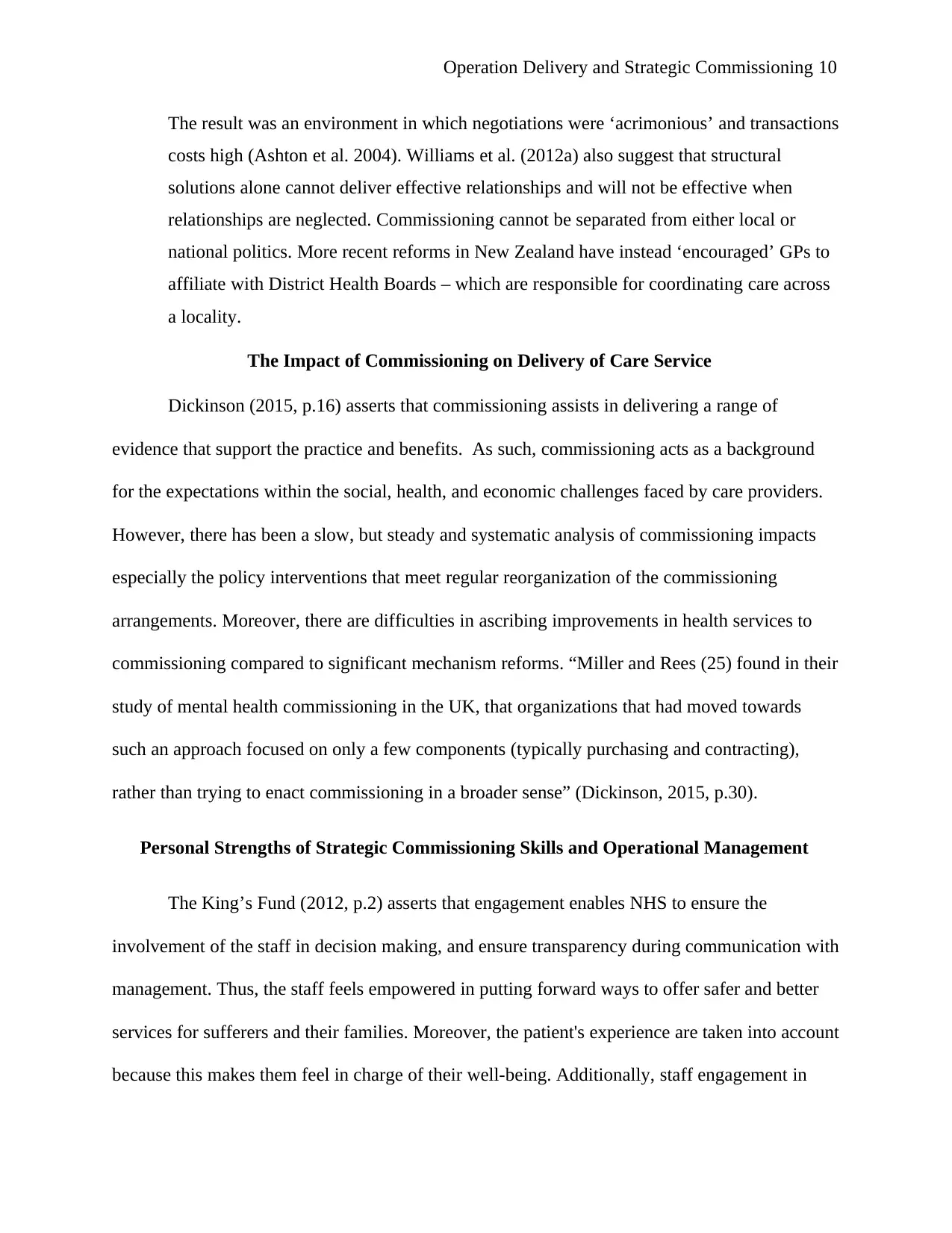
Operation Delivery and Strategic Commissioning 10
The result was an environment in which negotiations were ‘acrimonious’ and transactions
costs high (Ashton et al. 2004). Williams et al. (2012a) also suggest that structural
solutions alone cannot deliver effective relationships and will not be effective when
relationships are neglected. Commissioning cannot be separated from either local or
national politics. More recent reforms in New Zealand have instead ‘encouraged’ GPs to
affiliate with District Health Boards – which are responsible for coordinating care across
a locality.
The Impact of Commissioning on Delivery of Care Service
Dickinson (2015, p.16) asserts that commissioning assists in delivering a range of
evidence that support the practice and benefits. As such, commissioning acts as a background
for the expectations within the social, health, and economic challenges faced by care providers.
However, there has been a slow, but steady and systematic analysis of commissioning impacts
especially the policy interventions that meet regular reorganization of the commissioning
arrangements. Moreover, there are difficulties in ascribing improvements in health services to
commissioning compared to significant mechanism reforms. “Miller and Rees (25) found in their
study of mental health commissioning in the UK, that organizations that had moved towards
such an approach focused on only a few components (typically purchasing and contracting),
rather than trying to enact commissioning in a broader sense” (Dickinson, 2015, p.30).
Personal Strengths of Strategic Commissioning Skills and Operational Management
The King’s Fund (2012, p.2) asserts that engagement enables NHS to ensure the
involvement of the staff in decision making, and ensure transparency during communication with
management. Thus, the staff feels empowered in putting forward ways to offer safer and better
services for sufferers and their families. Moreover, the patient's experience are taken into account
because this makes them feel in charge of their well-being. Additionally, staff engagement in
The result was an environment in which negotiations were ‘acrimonious’ and transactions
costs high (Ashton et al. 2004). Williams et al. (2012a) also suggest that structural
solutions alone cannot deliver effective relationships and will not be effective when
relationships are neglected. Commissioning cannot be separated from either local or
national politics. More recent reforms in New Zealand have instead ‘encouraged’ GPs to
affiliate with District Health Boards – which are responsible for coordinating care across
a locality.
The Impact of Commissioning on Delivery of Care Service
Dickinson (2015, p.16) asserts that commissioning assists in delivering a range of
evidence that support the practice and benefits. As such, commissioning acts as a background
for the expectations within the social, health, and economic challenges faced by care providers.
However, there has been a slow, but steady and systematic analysis of commissioning impacts
especially the policy interventions that meet regular reorganization of the commissioning
arrangements. Moreover, there are difficulties in ascribing improvements in health services to
commissioning compared to significant mechanism reforms. “Miller and Rees (25) found in their
study of mental health commissioning in the UK, that organizations that had moved towards
such an approach focused on only a few components (typically purchasing and contracting),
rather than trying to enact commissioning in a broader sense” (Dickinson, 2015, p.30).
Personal Strengths of Strategic Commissioning Skills and Operational Management
The King’s Fund (2012, p.2) asserts that engagement enables NHS to ensure the
involvement of the staff in decision making, and ensure transparency during communication with
management. Thus, the staff feels empowered in putting forward ways to offer safer and better
services for sufferers and their families. Moreover, the patient's experience are taken into account
because this makes them feel in charge of their well-being. Additionally, staff engagement in
Paraphrase This Document
Need a fresh take? Get an instant paraphrase of this document with our AI Paraphraser
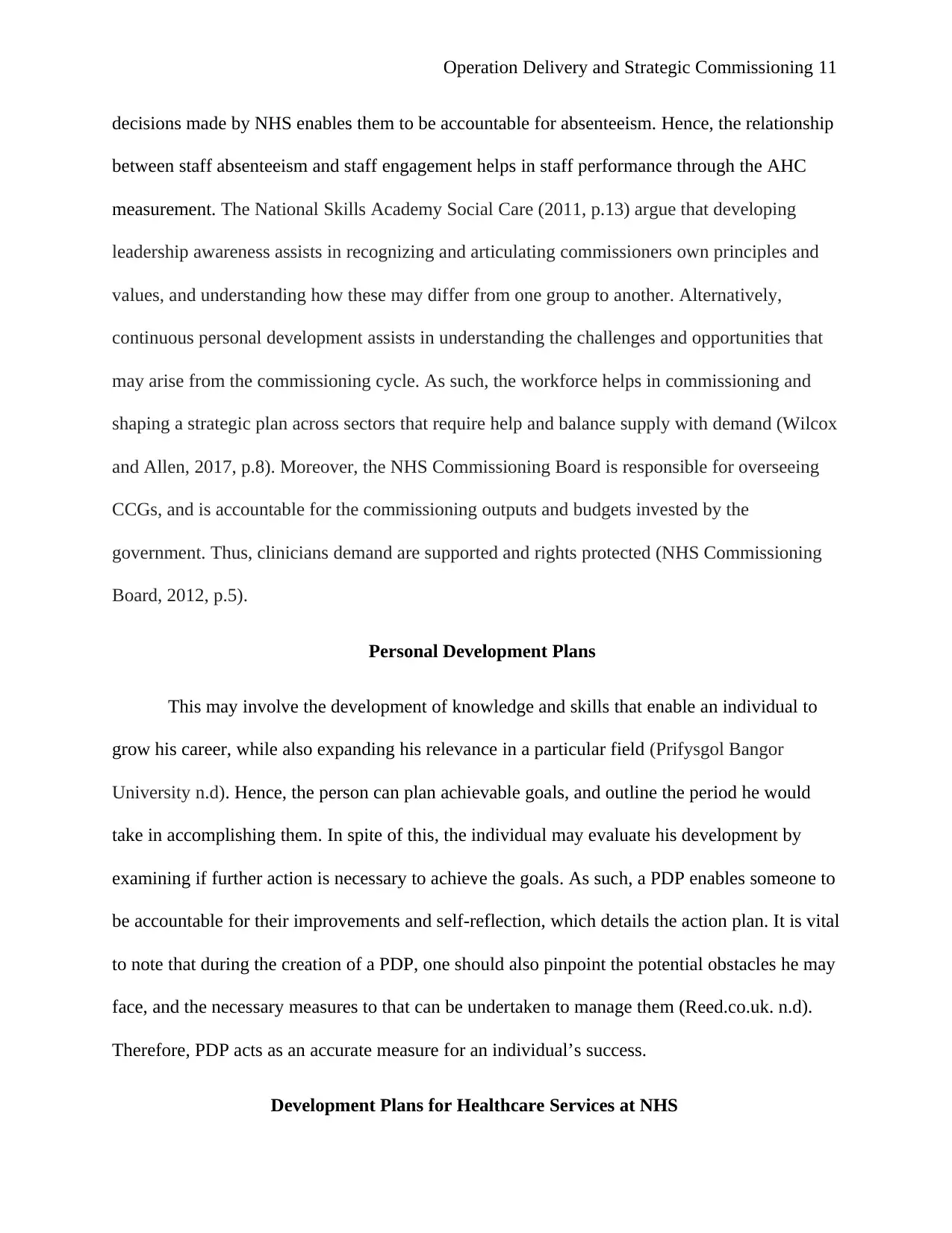
Operation Delivery and Strategic Commissioning 11
decisions made by NHS enables them to be accountable for absenteeism. Hence, the relationship
between staff absenteeism and staff engagement helps in staff performance through the AHC
measurement. The National Skills Academy Social Care (2011, p.13) argue that developing
leadership awareness assists in recognizing and articulating commissioners own principles and
values, and understanding how these may differ from one group to another. Alternatively,
continuous personal development assists in understanding the challenges and opportunities that
may arise from the commissioning cycle. As such, the workforce helps in commissioning and
shaping a strategic plan across sectors that require help and balance supply with demand (Wilcox
and Allen, 2017, p.8). Moreover, the NHS Commissioning Board is responsible for overseeing
CCGs, and is accountable for the commissioning outputs and budgets invested by the
government. Thus, clinicians demand are supported and rights protected (NHS Commissioning
Board, 2012, p.5).
Personal Development Plans
This may involve the development of knowledge and skills that enable an individual to
grow his career, while also expanding his relevance in a particular field (Prifysgol Bangor
University n.d). Hence, the person can plan achievable goals, and outline the period he would
take in accomplishing them. In spite of this, the individual may evaluate his development by
examining if further action is necessary to achieve the goals. As such, a PDP enables someone to
be accountable for their improvements and self-reflection, which details the action plan. It is vital
to note that during the creation of a PDP, one should also pinpoint the potential obstacles he may
face, and the necessary measures to that can be undertaken to manage them (Reed.co.uk. n.d).
Therefore, PDP acts as an accurate measure for an individual’s success.
Development Plans for Healthcare Services at NHS
decisions made by NHS enables them to be accountable for absenteeism. Hence, the relationship
between staff absenteeism and staff engagement helps in staff performance through the AHC
measurement. The National Skills Academy Social Care (2011, p.13) argue that developing
leadership awareness assists in recognizing and articulating commissioners own principles and
values, and understanding how these may differ from one group to another. Alternatively,
continuous personal development assists in understanding the challenges and opportunities that
may arise from the commissioning cycle. As such, the workforce helps in commissioning and
shaping a strategic plan across sectors that require help and balance supply with demand (Wilcox
and Allen, 2017, p.8). Moreover, the NHS Commissioning Board is responsible for overseeing
CCGs, and is accountable for the commissioning outputs and budgets invested by the
government. Thus, clinicians demand are supported and rights protected (NHS Commissioning
Board, 2012, p.5).
Personal Development Plans
This may involve the development of knowledge and skills that enable an individual to
grow his career, while also expanding his relevance in a particular field (Prifysgol Bangor
University n.d). Hence, the person can plan achievable goals, and outline the period he would
take in accomplishing them. In spite of this, the individual may evaluate his development by
examining if further action is necessary to achieve the goals. As such, a PDP enables someone to
be accountable for their improvements and self-reflection, which details the action plan. It is vital
to note that during the creation of a PDP, one should also pinpoint the potential obstacles he may
face, and the necessary measures to that can be undertaken to manage them (Reed.co.uk. n.d).
Therefore, PDP acts as an accurate measure for an individual’s success.
Development Plans for Healthcare Services at NHS
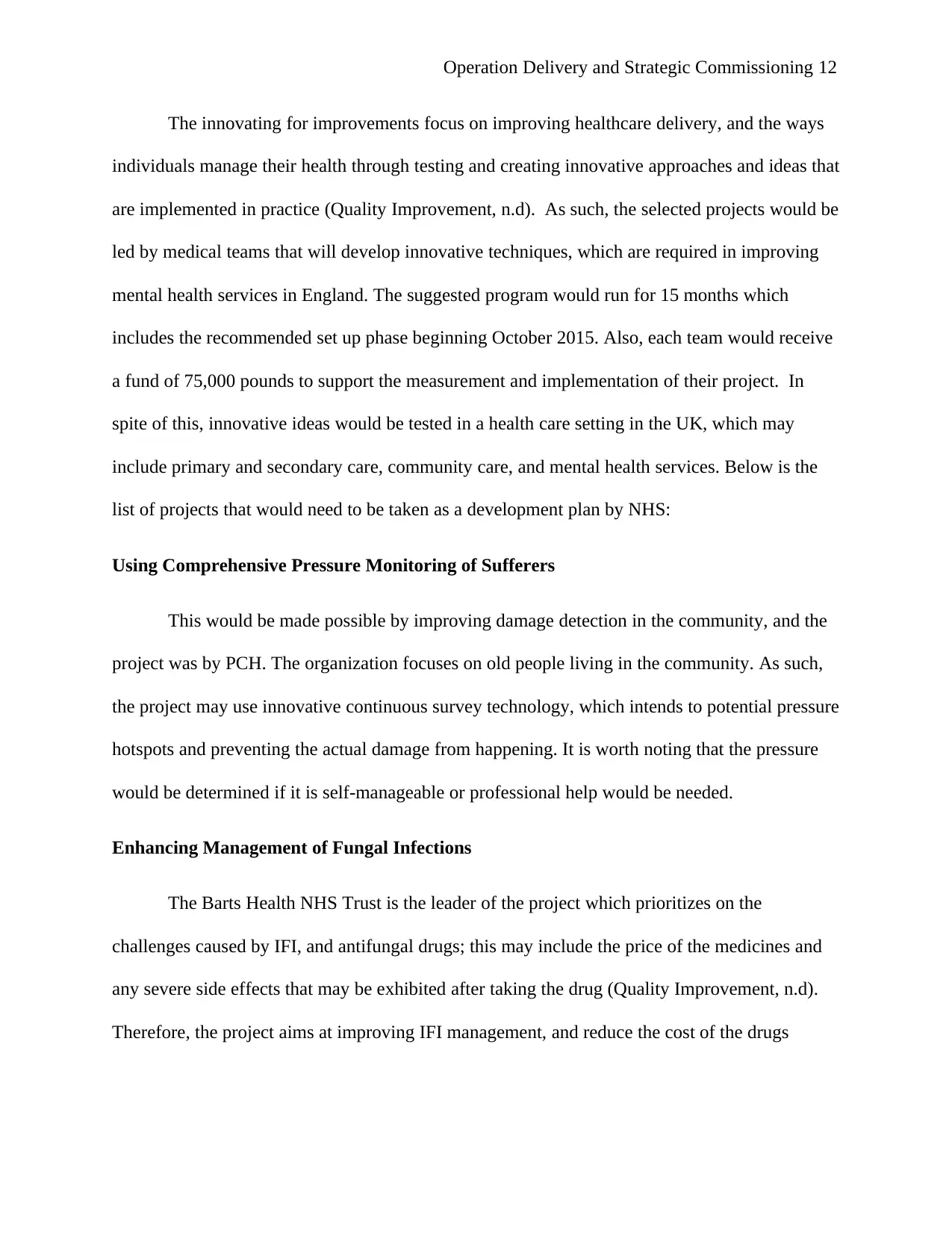
Operation Delivery and Strategic Commissioning 12
The innovating for improvements focus on improving healthcare delivery, and the ways
individuals manage their health through testing and creating innovative approaches and ideas that
are implemented in practice (Quality Improvement, n.d). As such, the selected projects would be
led by medical teams that will develop innovative techniques, which are required in improving
mental health services in England. The suggested program would run for 15 months which
includes the recommended set up phase beginning October 2015. Also, each team would receive
a fund of 75,000 pounds to support the measurement and implementation of their project. In
spite of this, innovative ideas would be tested in a health care setting in the UK, which may
include primary and secondary care, community care, and mental health services. Below is the
list of projects that would need to be taken as a development plan by NHS:
Using Comprehensive Pressure Monitoring of Sufferers
This would be made possible by improving damage detection in the community, and the
project was by PCH. The organization focuses on old people living in the community. As such,
the project may use innovative continuous survey technology, which intends to potential pressure
hotspots and preventing the actual damage from happening. It is worth noting that the pressure
would be determined if it is self-manageable or professional help would be needed.
Enhancing Management of Fungal Infections
The Barts Health NHS Trust is the leader of the project which prioritizes on the
challenges caused by IFI, and antifungal drugs; this may include the price of the medicines and
any severe side effects that may be exhibited after taking the drug (Quality Improvement, n.d).
Therefore, the project aims at improving IFI management, and reduce the cost of the drugs
The innovating for improvements focus on improving healthcare delivery, and the ways
individuals manage their health through testing and creating innovative approaches and ideas that
are implemented in practice (Quality Improvement, n.d). As such, the selected projects would be
led by medical teams that will develop innovative techniques, which are required in improving
mental health services in England. The suggested program would run for 15 months which
includes the recommended set up phase beginning October 2015. Also, each team would receive
a fund of 75,000 pounds to support the measurement and implementation of their project. In
spite of this, innovative ideas would be tested in a health care setting in the UK, which may
include primary and secondary care, community care, and mental health services. Below is the
list of projects that would need to be taken as a development plan by NHS:
Using Comprehensive Pressure Monitoring of Sufferers
This would be made possible by improving damage detection in the community, and the
project was by PCH. The organization focuses on old people living in the community. As such,
the project may use innovative continuous survey technology, which intends to potential pressure
hotspots and preventing the actual damage from happening. It is worth noting that the pressure
would be determined if it is self-manageable or professional help would be needed.
Enhancing Management of Fungal Infections
The Barts Health NHS Trust is the leader of the project which prioritizes on the
challenges caused by IFI, and antifungal drugs; this may include the price of the medicines and
any severe side effects that may be exhibited after taking the drug (Quality Improvement, n.d).
Therefore, the project aims at improving IFI management, and reduce the cost of the drugs
⊘ This is a preview!⊘
Do you want full access?
Subscribe today to unlock all pages.

Trusted by 1+ million students worldwide
1 out of 21
Related Documents
Your All-in-One AI-Powered Toolkit for Academic Success.
+13062052269
info@desklib.com
Available 24*7 on WhatsApp / Email
![[object Object]](/_next/static/media/star-bottom.7253800d.svg)
Unlock your academic potential
Copyright © 2020–2026 A2Z Services. All Rights Reserved. Developed and managed by ZUCOL.





